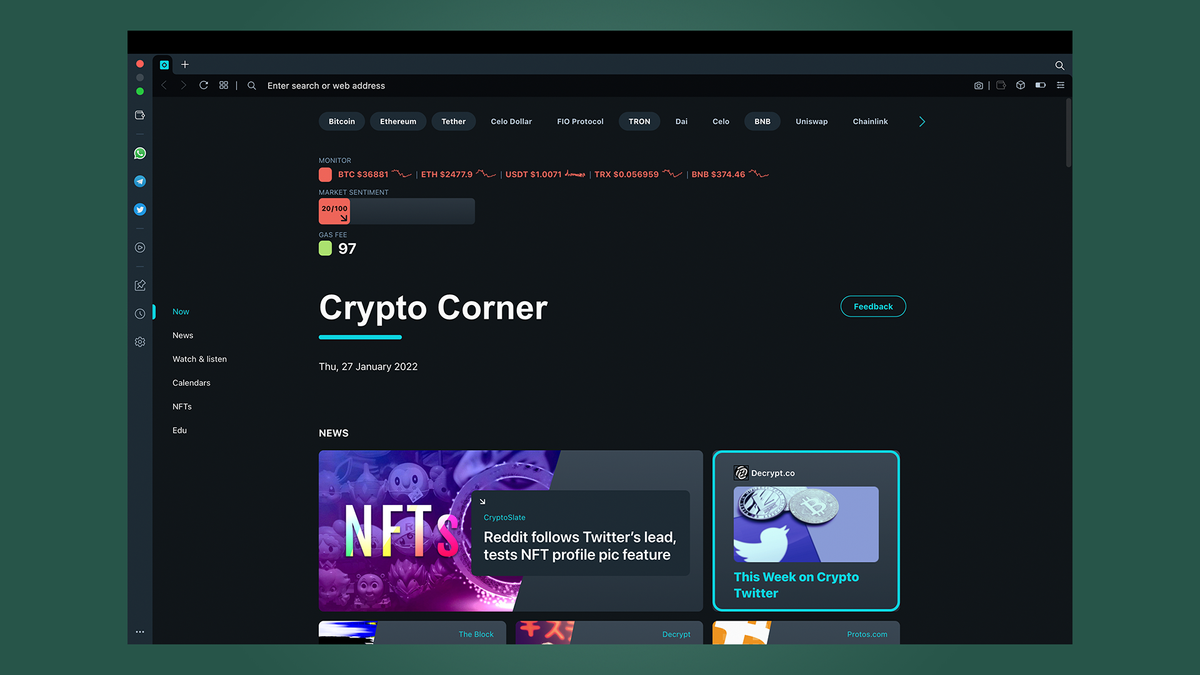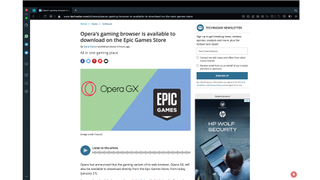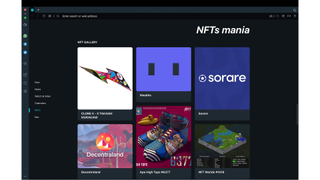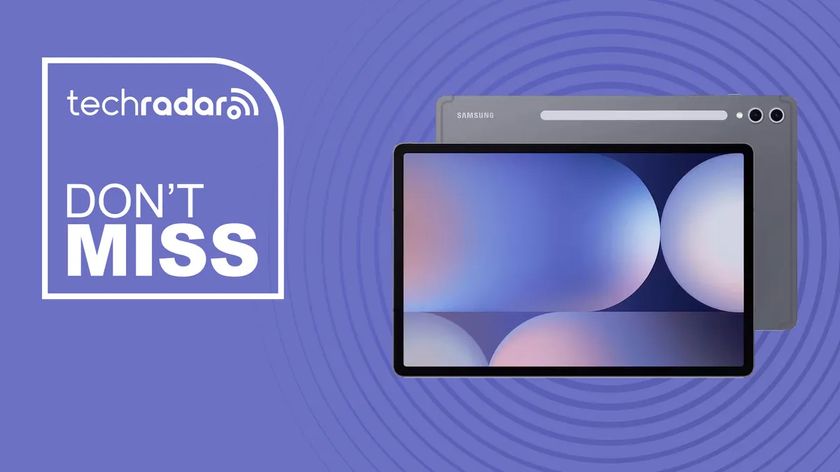We talk to Opera about why we should care about a new crypto browser
Interview: Opera goes crypto - but why?

Cryptocurrency is a field that’s only grown since its inception, and Opera wants in. The company is making headway by developing another variant of its web browser: the Crypto Browser Project.
This app enables users to store their crypto wallets within the new browser. Users can also follow and manage different types of electronic coin, as well as the controversial NFT content that’s being offered by various companies. These capabilities are all grouped into what’s called Web3, a collection of activities that some predict will be heavily used across the web in the coming years.
Opera is breaking into new frontiers, creating specialized browsers like the gaming-focused GX. The Crypto Browser Project is Opera’s attempt to target users that have a crypto wallet.
TechRadar spoke with Jan Standal, VP of Product Marketing at Opera, to understand the need for a cryptocurrency-focused web browser.
The crypto-elephant in the room
If you’ve used an Opera product before, the Crypto browser will feel familiar to you. The layout is similar, but with a blue and green color scheme.
We asked Standal what Opera’s browser could offer to the crypto market:
“Browsers have always provided a trusted gateway through which consumers experience and engage with the internet - and all the new digital trends and technologies on it,” Standal explains. “With the Crypto Browser Project, we set out to build the first truly custom experience for people who want to experience blockchain and Web3 technologies, channeling almost three decades of experience we have in creating user-friendly browsers.
Get daily insight, inspiration and deals in your inbox
Sign up for breaking news, reviews, opinion, top tech deals, and more.
“Our Crypto Browser lowers the barriers to entry to the Web3 world by providing our users with easy access to blockchain news and tutorials, seamless browsing of Web3 Services and apps, and our trusted non-custodial wallet built directly into the browser.”
Why go all-in with a browser, rather than a plugin?
We wondered why the aim was a browser from Opera focusing on cryptocurrency, rather than a browser extension.
“By controlling the browser, we are able to solve experiences that can’t be solved with just extensions. Take, for example, the secure clipboard feature in the Crypto Browser beta: it protects your wallet address from being manipulated by other apps. Solving such cases makes Opera the most secure option for cryptocurrency and Web3 enthusiasts - something that wouldn't be possible to do with traditional browsers.
“While the shift to Web3 is underway, most of the apps are being created by small software companies, and we hope they can benefit from our technologies, experience, and user base.”
Since cryptocurrency is still in its infancy, we asked Standal how the browser could cater to different types of crypto.
“Partnerships are a priority for Opera - we are pursuing an inclusive multi-chain strategy. By creating a solution respectful of all ecosystems, and encouraging the development of common standards and practices amongst developer communities, we hope to help this incredible and diverse new field of creators achieve the fullest potential for their technologies.”

We pressed Standal on Opera’s decision to create a separate browser that focuses on cryptocurrency rather than incorporating crypto features into Opera or Opera GX.
“With the Crypto Browser Project, we are trying an all-in approach, providing people with a specific experience they need in order to interact with Web3,” Standal explains. “As the technologies of Web3 become more advanced, we will see a strong divergence in the way the browser will interact with the world - and it was important that we prepared for that.
“We believe that if you’re interested in cryptocurrencies, blockchain technologies, even funny coins, you should have a dedicated space for that. If you’re starting and simply want to understand the space better, the Crypto Browser Project will be the perfect starting point.”
Standal continued: “With Opera GX, we learned the power of community, and how we could craft a browser built just for the needs of our awesome gaming users. With the Crypto Browser project, we are showing the same care and attention to the crypto community focused on safe, easy, and intuitive access to crypto services and tools in a way even a novice can understand.”
Feeling safe with crypto
There’s still the ongoing issue of security and authenticity when it comes to bitcoins. There’s also this persistent idea that crypto goes hand in hand with gambling, especially considering Bitcoin’s rise and fall in value is always making news. We asked Standal what steps Opera has taken with this browser to keep users safe.
“While it's true that crypto is not for everyone yet, we see that millions of our browser users are already onboarding to crypto and Web3 is happening. We strongly believe that it's better for serious companies to participate in the space, help the users and shape the industry rather than avoid it,” Standal explains. “Helping our users avoid scams is a natural part of this. The Crypto Browser provides you with the Crypto Corner, which is a source of tutorials, access to influential publications, and key information about the space. There’s also a whole set of security and privacy features such as the built-in VPN, ad blocker, the secure clipboard, and others.”
NFT
Another side to cryptocurrency is the NFT, or Non-fungible Token. These are digital assets, like images or videos, that are allegedly uniquely yours. Opera’s crypto browser will allow you to use your wallet to purchase these. We wanted to know where the company stood on this process.
“Those steps are outlined on NFT platforms,” Standal clarifies. “From our side, we make sure no one meddles with your wallet address by providing you with a built-in wallet and a secure clipboard to copy and paste your wallet address and other sensitive data.”

The company also announced in a blog post that the crypto browser is in development for Apple devices, and will be submitted to the App Store. But with features allowing users to manage their crypto wallet within a web browser, we asked Standal if Apple’s most likely response will be to reject the app, especially if there's explicit ways to buy and sell crypto.
“The Opera browser for iOS already comes with an array of crypto features. The Crypto Browser Project isn’t that different in terms of features; rather [it] builds them into a unified experience,” Standal continues. “It’s your entry point into Web3, with its apps and other solutions - as well as providing information about blockchain technologies. And [it’s] a safe and trusted source for where to explore next.”
Analysis: is this web browser a sign of things to come?
It was surprising to see Opera announce a web browser solely focused on cryptocurrency. Considering some of the negative connotations of the field, it’s currently a slippery slope for any company to include any features that involve crypto and NFT content.
But Opera has gone all-in with this venture by presenting an entirely new browser, as opposed to a feature or a browser extension. While Standal maintains that the Opera Crypto Browser can guide users in crypto wallet management, while helping them to keep track of any other trend within the world of electronic currencies, users might do well to use dedicated apps instead.
Companies like Coinbase offer apps that give you a direct overview of your wallet, and only your wallet. Having a web browser that lets you watch YouTube videos, while allowing you to keep track of Bitcoin, may be too much for most users.
Time will tell if other browsers, such as Firefox and Microsoft Edge among others, will introduce features focused on cryptocurrency. We’d be surprised if any other company went the extra mile and created a whole crypto-browser, in the same way that Opera has.
Crypto could still be a fad that ends, a story that’s remembered at the end of the decade in some Netflix documentary. But then again, if companies don’t push some boundaries, we’ll know how far technology can go - or how convenient new ideas might be for us.
- Our pick of the best web browsers for 2022

Daryl had been freelancing for 3 years before joining TechRadar, now reporting on everything software-related. In his spare time, he's written a book, 'The Making of Tomb Raider'. His second book, '50 Years of Boss Fights', came out in 2024, with a third book coming in 2026. He also has a newsletter called 'Springboard'. He's usually found playing games old and new on his Steam Deck, Nintendo Switch, and MacBook Pro. If you have a story about an updated app, one that's about to launch, or just anything Software-related, drop him a line.












